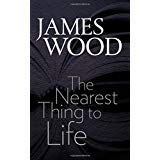In the days leading up to the March 17 announcement of the 2015 NBCC award winners, Critical Mass highlights the thirty finalists. Today, NBCC board member Eric Liebetrau on criticism finalist “The Nearest Thing to Life” by James Wood (Brandeis University Press).
Effective literary criticism depends on balance. The best critics strike the right mixture of description, context, analysis, quotation, and comparison, as well as a few trenchant insights that may take readers by surprise. In The Nearest Thing to Life, the New Yorker contributor James Wood—for my money, the king critic of contemporary fiction—does all that and more, injecting the proceedings with a pleasing dose of autobiography, the autobiography of one of our most voracious, and conscientious readers.
For such a slim collection—the four sections, originally delivered as separate lectures, total 124 pages—the number and diversity of writers considered is dizzying. On a single page, we encounter Samuel Johnson, William Hazlitt, Samuel Taylor Coleridge, Virginia Woolf, V. S. Pritchett, Milan Kundera, Zadie Smith, Ali Smith, and David Foster Wallace. Certainly, this is no book for English 101, but it is an example of a fiction critic working at the top of his game.
Most of us who take reading seriously are familiar with Wood’s work, and many of us disagree with him, but his knowledge, background, and passion are unimpeachable. Go read any of his book reviews at the New Yorker (or one of my favorite pieces of music criticism of the past few years, his fascinating analysis of his obsession with the drumming of Keith Moon). You may take issue with his assessment of a particular work—even vehemently so—but it won’t be due to a poorly articulated argument or lack of genuine engagement with, and close reading of, the work.
What makes The Nearest Thing to Life so special is the author’s obvious investment in the material and joyous wonder at the power of fiction to illuminate many of life’s most intriguing questions. He provides a seamless interweaving of anecdotes from his life, making us feel along with him the joy, the absolute visceral pleasure, he experiences when reading a good piece of fiction. He’s the perfect guide, simultaneously accessible and deeply erudite, to the contemporary fiction landscape.
“Wordsworth called his brother John ‘the silent poet,’ and in this sense, perhaps, we are all silent poets,” he writes. “But really we are all silent critics, since not everyone has a poetic eye but everyone has an opinionated tongue. To evaluate is not only natural and instinctive, it is what writers supremely do, so that when we are evaluative we are writerly.”
Wood is inclusive, and he invites us behind the critics’ curtain to witness the process, what, as he notes, British essayist Thomas De Quincey once called “us[ing] all there is to use.” Throughout his life, Wood has taken advantage of every opportunity to do just that, and one of his more personal stories provides an apt demonstration. In “Using Everything,” the author discusses his discovery, at the age of 15, Martin Seymour-Smith’s Novels and Novelists, a seemingly prosaic reference-type book that nonetheless proved to be a remarkably important work to the young author. While it may have been “easy to mock a book like this” and its “total encyclopedic coverage,” Wood found it had “an intoxicating air of urgent aesthetic advocacy, an apparent proximity to the creative source, a deep certainty that writing mattered, that great books were worth living and dying for, that consequently, bad or boring books needed to be identified or winnowed out.”
Circling back to the earlier point about critics delivering surprising, aha! moments, Wood writes, “literary criticism is unique because one has the great privilege of performing it in the same medium one is describing. (Pity the poor music critic, the forlorn art critic!)” It’s a seemingly obvious, fundamental thought regarding literary criticism, yet it’s not something I had fully considered before reading that sentence. As with all his works, The Nearest Thing to Life is packed with such tidbits of wisdom, but each one—and each of the dozens of authors he addresses—is in service of the concept that “literary evaluation…[cannot] be separated from the general messiness of being alive.”
Links:


